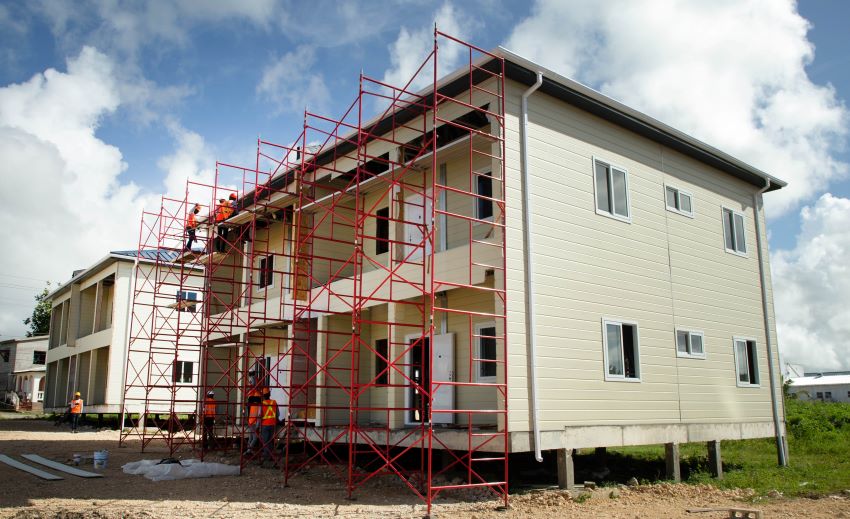
The Special Audit Report of the project for the Acquisition and Assembly of Steel Housing Units being executed by a company called East West Building Solutions (Barbados) Inc., under the aegis of the Ministry of Housing was received and responded to by the Ministry. In keeping with the Ministry’s commitment to transparency, the Report of the Special Audit was laid in Parliament on the 28 March 2024.
The facts relating to the project and the audit are that on July 2, 2021, Barbados was impacted by Hurricane Elsa, causing unprecedented damage to our housing stock which was already compromised by a cascade of extreme weather events. These included a ‘Freak Storm’, on June 17, just two weeks prior to Elsa and the Ash Fall which covered the entire island as a result of the eruption of the La Soufriere volcano on the neighbouring island of St. Vincent. The severe environmental disruptions and damage coincided with the COVID-19 pandemic which impacted all aspects of life globally and in Barbados.
This combination of weather events, but particularly Elsa, destroyed or seriously damaged the homes of several Barbadians, leaving them homeless. Initially, 2,300 houses were reported damaged to the Department of Emergency Management (DEM), including 145 which needed to be completely replaced. Subsequent assessment and verification by government agencies identified that 750 houses required complete rebuilding, and a further 980 needed to be repaired.
The Barbadians affected were some of the most vulnerable in the country and Government sought urgent housing solutions for those who were affected. Consequently, all Government’s housing agencies were mobilised to repair and replace the damaged houses in the shortest possible time. Government was particularly seeking housing solutions that would be fast and resilient to future environmental damage.
One such solution was steel frame houses which the Ministry determined could satisfy at least 20 percent (150) of the total number of the houses which needed to be completely rebuilt. The steel frame houses proposed would be resistant to category 3 hurricane force winds. The fact that the steel frame houses would also be termite and fire resistant and could be constructed in a six to eight-week time frame, were all taken under consideration. The steel frame houses met all the criteria to give the best options to the Barbadians who were then without homes.
A budget of $29,080,200 was estimated to purchase, import and erect 150 steel-framed houses, which included the cost of the foundations and other external ancillary works. Under the terms of the project, the Government of Barbados, through the Ministry of Housing, is responsible for foundations and ancillary works, while East West Building Solutions is responsible for installing the houses.
A number of factors, many beyond the Ministry’s control, have impacted this project, including increased costs.
- Two of the most significant factors leading to increased expenditure were:
- Initially, infrastructural development such as roads and the installation of electricity was not included in the original cost of the project as it was expected that this work would have been executed by the National Housing Corporation (NHC) from the Corporation’s budget. However, to accelerate the project by developing six sites for 113 of the houses, a change in the scope of the project saw the Ministry taking over this process at an estimated cost of $5,068,051. This was not part of the original project.
Let me explain this point. In addition to using resources from NHC, another reason that infrastructural costs were not included in the original budget, was because it had been anticipated that 74 of the 150 houses to be built by East West, would be located on existing, fully serviced and developed house spots that would replace the houses damaged by Hurricane Elsa. This meant that no infrastructural development would have been required. The remaining units were to be made up of 36 quad and 40 duplex units and were to be placed on lands under the control of the NHC.
Legal and other issues resulted in relocating from the original Hurricane Elsa impacted sites to new sites which required earth works and other infrastructural costs that were not part of the original budget. In the interim, because of COVID and the Russia-Ukraine war, there was a significant increase in the cost of construction materials including those for the foundations, domestic sewage works including wells, septic tanks and the like. This resulted in additional expenditure of $2,442,454.
The project was further challenged by the lack of timely access to the specific type and volume of concrete required to construct the foundations. This contributed to more delays and higher costs, and once the sites were developed occasioned the need to provide security and sanitation. The additional expenditure on these items is approximately $1,927,132 and again would not have been budgeted for.
- Labour costs also impacted the project. Because of the urgency of the project, initially the decision was made to utilise Chinese labour. Firstly, Chinese costs were four times lower but significantly, the Chinese also possessed the expertise to erect this new housing solution to the island. The Ministry’s idea and intention was that during the building phase Barbadians would train and work with the Chinese to become familiar with the building systems and techniques being used, resulting in a transfer of knowledge to Bajans.
Unfortunately, this did not go as planned, as East West was unable to secure transit visas for their workers to get to Barbados. The Government stepped in to assist with this process, in the interest of the public purse, and also in an attempt to get citizens back into their homes in the shortest possible time.

However, despite the best efforts on both sides we were unsuccessful in getting the workers into Barbados. The decision then had to be taken to utilise local labour to install the houses, at a significantly higher additional cost of approximately $9,732,570, as compared to $3,690,750 which it would have cost using Chinese labour.
To be absolutely clear, at the commencement of the project, the East West management team arrived in Barbados, this team included their project managers who trained the local contractors and artisans as opposed to the initial concept which was to have local and Chinese labourers working alongside each other and working on the projects together.
Although using local labour significantly increased the construction costs, Barbados now has approximately 80 to 90 individuals skilled in assembling and installing this type of housing solution. These artisans have been retained by East West, together with a number of small sub-contractors whose workers now also have the skills to install this type of housing solution. This also means that these funds are being paid to Barbadians working on the project.
- Then there were other factors which affected the project throughout its duration.
- Disruption of the international supply chains due to the COVID-19 pandemic which caused shipping delays and resulted in the late arrival of the houses by approximately two months;
- Increase in freight costs due to oil prices and war;
- The unavailability and dramatic cost increase of containers for global shipping. As a result, the project was affected by a four times increase in the price of shipping containers from $5,000 to $20,000 per container;
- Legal issues surrounding the rights to the lands occupied by a significant number of Hurricane Elsa clients, which resulted in considerable delays or the abandonment of some locations as project sites;
- The construction of foundations and infrastructure were slowed by heavy unseasonal rains, particularly during the excavation phase of the works;
- The short supply of local construction labour as a result of the construction boom in Barbados severely handicapped the work.
In total, project overruns from factors outside the scope of the Ministry amounted to $12,175,024. Expenditure from the change in the scope of the project is $6,995,18. The total additional project expenditure has been calculated at $19,170,207. Of the 150 houses which were to be rebuilt, East West has completed 61. The remaining 89 will be completed in this financial year. Of the 89 remaining houses, 36 are to be located at Bullens, Holders Hill, St James, 16 at Sargeants Village, Christ Church, 14 at River Crescent, St. Philip and 23 at Todds, St. George.
As anyone who has built even a small house knows, every delay pushes costs up and on this project there were several delays that could not be helped. In some instances, there were errors in our projections. It is true that hindsight gives 20/20 vision. So, with hindsight, for instance, one can say that the initial projected four-month timeline for the supply, shipping and the installation of housing units was unrealistic, given the prevailing global conditions at that time.
However, it must be reiterated that our main goal was to get displaced Barbadians back in their homes, resilient homes, as soon as humanly possible. Our estimated costs at the outset of the project were applicable to the circumstances at that time but no one could not have anticipated the dramatic market changes caused by global circumstances which resulted in increased costs, against which the Ministry has done its best to protect the public’s purse.
On completion, this project will result in displaced Barbadians having more sturdy and improved housing quality. We give the commitment that the Ministry will improve its efficiency and systems while we continue our ambitious programme to provide housing solutions for Barbadians.
Minister of Housing, Lands and Maintenance, Dwight Sutherland
